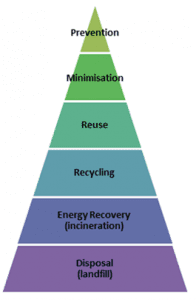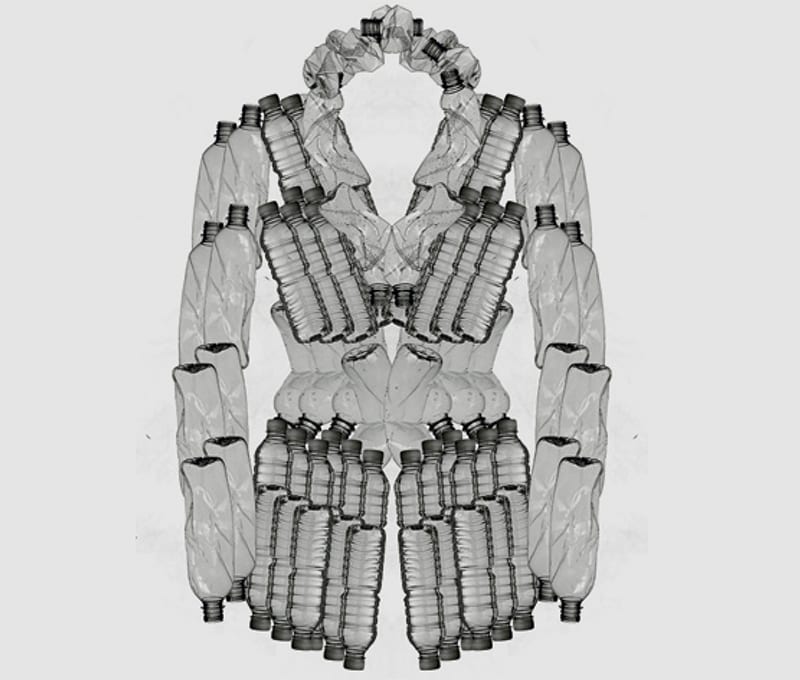Back
Friday September 23, 2022
Recycling and Recyclability – The Journey Towards Circularity

Uniforms and Recycling – possibly not two words synonymous with each other. At Tailored Image, however, the company has found ways to weave recycling into its very fabric. With a dedicated Sustainability Task Force which encompasses every department across the organisation meeting monthly, recycling and recyclability of materials across the organisation is very high on the agenda and goes beyond standard practises. In this article, we explore the great lengths the company is going to in order to tackle an issue so important to it, its customers and to the world around us.
Certification
In an effort to reduce waste management costs and demonstrate its commitment to protecting the environment, Tailored Image has proudly held its ISO 14001 Environmental Management System certification for 4 years now. This is a certificate which the company is particularly proud of and is a demonstration of commitment to the environment and to incorporating recycling into all areas of the business. In dealing with suppliers, the company strives only to work with organisations achieving the same level of compliance and the Sustainability Task Force ensures that recycling is kept uppermost in the mindsets across every department.
Recycled Uniform Options
A huge departure for Tailored Image and for the uniform industry as a whole, the company can now offer a full range of sustainable recycled uniform options. The roll out of easyJet’s new uniform range, for example, saw the suiting elements of the company’s uniforms manufactured from sustainably sourced fabric where the polyester element of the fabric is manufactured from plastic bottles. On average, each tailored suit using this source prevents 45 plastic bottles from reaching landfill.
How does this process work?
- The polyester is produced from recycled plastic bottles, which have been washed, crushed and turned into plastic flakes.
- The flakes are then melted down and extruded into fibres.
- Fibres are then spun into yarn filament.
- The yarn is then woven into fabric.
- The fabric is subsequently cut, sewn and turned into garments.
This uniform production journey involved replacing the standard (virgin) polyester element of the suit with the recycled polyester initially in a uniform trial. Having been successful and meeting all technical requirements, the uniform was subsequently rolled out across 14,000 staff throughout easyJet’s European operation. Click here to find out more or read the full case study here.
As a follow on from the success of this pioneering project, Tailored Image is now working with a banking client in Ireland to supply staff with a 100% fully sustainable and recycled uniform. This institution will be the first corporate client in Ireland and the UK to offer this fully sustainable and recycled uniform to their employees. The range is created from:
- Suiting and Tailoring – Polyester element produced from recycled plastic bottles
- Skirts/Blouse – Reprieve Polyester/ BCI Cotton (Better Cotton Initiative)
- Knitwear – Sustainable cotton/recycled polyester
- Ties/Scarfs – 100% recycled polyester
- All packaging used in the uniform and person-packs produced in 100% recycled materials
The approach to using recycled materials for garments is not just led by customers. Tailored Image has taken a proactive approach to the use of recycled material across its operation. Since the first quarter of 2021, six months ahead of target, Tailored Image has replaced all virgin polyester in bespoke tailored suiting garments with recycled polyester. This is also utilised in the production of many other garments with the aim of replacing a minimum of 50% of virgin polyester with recycled polyester on these garments by the fourth quarter of 2022. Efforts will not stop here; with a world-class supply chain team Tailored Image constantly investigates and interrogates fabric innovation with a view to improving the sustainability of its garments.
Clean and Reuse Service
A relatively new initiative, the Clean and Reuse service is currently utilised mainly by military and police force clients, where the uniforms are of particularly high value due to the complexity of design and sophistication of the tailoring and embroidery. The ‘Clean and Reuse’ process involves clients returning worn garments to Tailored Image for upcycling when someone leaves deployment. The garments are received at Tailored Image, undergo a full examination, have any faults or slight damage repaired and are then laundered before being returned to the service again for use by a new member. This results in a whole range of garments being reissued and worn rather than ending up in landfill which would often have been the case before the inception of this initiative.
Tailored Image consistently strives to improve secure disposal of corporate uniform, recognising the need to protect brand security whilst aiming to reduce its landfill and environmental impact. Wherever possible, a 7-stage plan for disposal of garments is followed:

In most cases, the company utilises a “Green Reparation Company”. This ensures the existing uniform is disposed of using a responsible outlet that can deal specifically with used corporate wear. The company also works with aid organisations and educational bodies to upcycle/repurpose pre-worn garments. This is not only economically sound but also has social and environmental advantages.
Tailored Image delights in offering a recovery service to clients where used garments are disposed of in a charitable way. The company has recently carried out this service for a major national bank that had expressed a desire for their garments to be utilised by an aid organisation. At times brand security is a factor in the recycling and reusing of corporate clothing. Options in this situation are more limited and range from secure shredding or de-badging of branded workwear. In some instances, garments can be reused, for example by over-sewing logos or using heat seals to cover the original branding. Where possible, Tailored Image’s in-house design department works to upcycle garments so that these can be given to homeless and other charitable organisations. Certificates provided by the charity for this service will then be passed on to the client.
As part of Tailored Image’s Corporate Social Responsibility agenda, recycled garments and fabrics and unbranded garments are often donated to a range or organisations including:
- Local Primary & Secondary Schools
- Further and Higher Education Institution in Belfast, Northern Ireland
- Special/Exceptional Needs (Physical Disabilities)
- Local Charities
- Homeless Shelters
Upcycling
Further to the recycling programme at Tailored Image, the company now uses the resources of an English based company – Upcycle Labs – to dispose of uniforms in an environmentally friendly and secure way. Upcycle Labs is a material science and technology company providing innovative upcycling services for unwanted and pre-worn uniforms. The garments delivered to Upcycle go through a five-step process, with the main benefit of this process being that the garment does not need to be degraded and the trims do not need to be broken down or removed. This process allows 100% of the item to be recycled; everything can go through the circular waste handling process. With the addition of environmentally friendly chemicals, the garments are turned into granules which are processed and turned into other commercial products such as table tops and other office items meaning that a customer can recycle their uniforms into useable office furniture – exactly the circularity that Tailored Image strives for.
Packaging
Tailored takes a very pro-active approach to the use of sustainable and recycled packaging, having recently undertaken a 12-month plan of action to actively minimise and reduce the overall use and composition of packaging materials.
To date, the following measures have been implemented on garment purchases:
- Introduction of 100% recyclable polybags – purchased from a sustainable source which helps further reduce the company’s carbon footprint. These bags are used on all bespoke sourced garments, from around the world. This action has replaced the use of the traditional plastic bag which could not be recycled.
- Shirt packing boards (the cardboard on which the shirt is folded around to give the shirt shape and to help avoid wrinkles) are now produced using 100% recycled cardboard. At the same time, the white chemical resin coating previously used on packing boards has been eliminated.
- The use of plastic clips and nickel-based metal grips in the packaging of shirts and blouses has also been eliminated, having been replaced with recyclable metal clips.
- The use of inner cardboard boxes in the bulk packaging of shirts has been eliminated.
- Introduction of 100% recycled/reusable person packs and mailing bags.
- Currently in the process of eliminating all plastic hangars from garments.
Warehouse Waste
In addition to the recycling processes encompassed for individual garment items, Tailored Image embraces a similar process across the packing and delivery of person packs. All the board used in the production of cartons is made from at least 90% recycled fibres and 100% of the carton can be recycled – they’re also fully biodegradable. Any new material used comes from managed softwood forests that are certified as sustainable. When an order is packed, the most appropriate carton or bag (also fully recyclable) will be chosen for the size and shape of the garment to ensure no waste of space. Cardboard boxes are reused where possible and in the event of where boxes become damaged, such boxes are disposed of through licensed contractors who facilitate, ensure and certify their recycling.
Across every touchpoint of the organisation from manufacturing, through delivery, storage and operations, recycling is a major part of the Tailored Image ethos and will continue to be so as new technologies and opportunities are further embraced.


